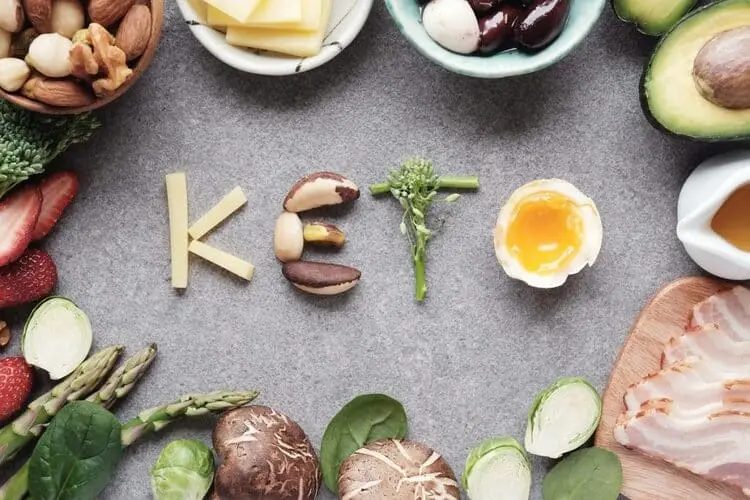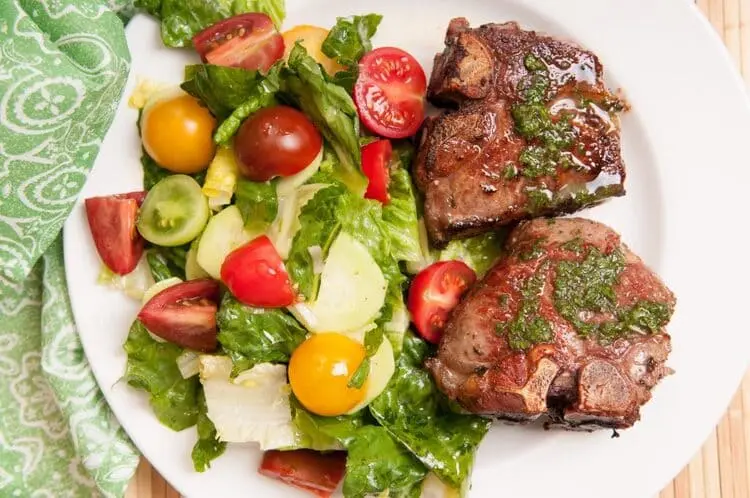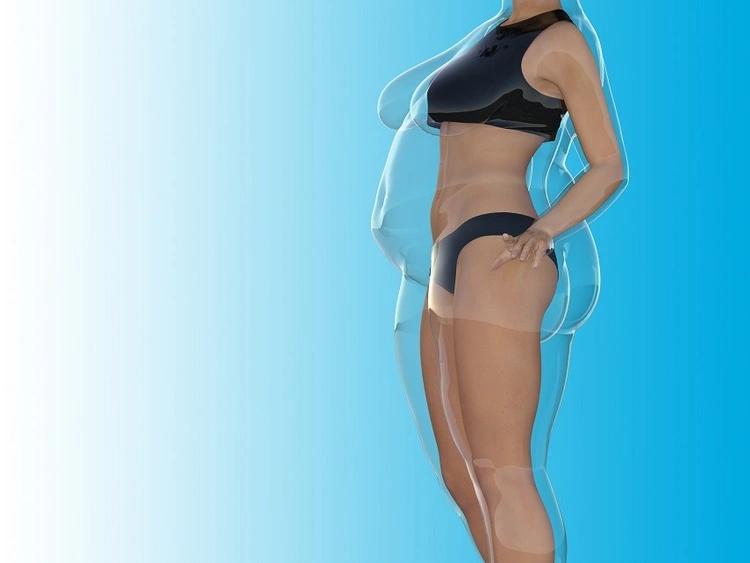Ketogenic diet for beginners
Contents
Ketogenic diet (keto) is a strictly low-carb diet, turning your body into a fat-burning machine. It is highly effective in losing weight, improves overall health and well-being, but you can encounter some side effects at the beginning.
Ketogenic diet is similar to other low carbohydrate diets, but the main difference is the reduction in protein intake.
Ketogenic diet leads to the state of ketosis.
What is ketosis?
Being in ketosis, the body produces ketones, compounds that are an alternative fuel for the body used at low blood sugar levels.
Ketones are produced when we consume small amounts of carbohydrates (which are quickly converted into sugar) and moderate amounts of protein (excess protein can also be converted into sugar). Ketones are made in the liver and used to power the brain, which needs large amounts of energy that cannot be provided only by the supply of fat. This is only possible through glucose or ketones.
The ketogenic diet causes the body to switch to getting energy from fat burning. The level of insulin in the blood decreases very much, while fat burning increases. The body gains easy access to stored fat and burns it. This is a great way to lose weight, but it’s not the only benefit of ketosis. Reduced hunger and a constant supply of energy are just two others, and there’s more.
Fasting is the easiest way to go into ketosis, but you can’t fast forever. You can try a ketogenic diet instead, which will result in the same.
Who should not use a ketogenic diet without consulting a specialist first ?
Most people can use it without fear. If you belong to one of the following three groups, you will need special preparation, preferably after consulting a doctor or specialist:
- People taking diabetes medications
- People taking drugs for hypertension
- Breastfeeding women
Ketogenic diet benefits

The benefits of using a ketogenic diet are similar to those of any low-carb diet. However, the effects may be stronger because protein intake is more limited. This increases the amount of ketones and reduces the level of insulin, which is responsible for storing fat.
Weight loss
Switching the body to burning fat primarily brings weight loss. It has its source in increasing fat burning by lowering insulin levels. This creates the perfect circumstances for you to lose weight without feeling hungry.
About 20 different scientific studies have shown that compared to other diets, low carbohydrate and ketogenic diets give the best results.
Reverses type 2 diabetes
The ketogenic diet is a great way to reverse type 2 diabetes because it reduces insulin levels and inhibits the negative effects of high levels.
Increased mental focus
Ketosis brings constant supply of ketones to the brain. Ketogenic diet allows you to avoid blood sugar levels spikes. As a result, mental abilities and concentration increase.
Many people use the ketogenic diet because of increased mental abilities. Interestingly, most tend to think that it is necessary to supply the brain with large amounts of carbohydrates so it could function properly. This claim is only true if ketones are not available.
Increased physical endurance
Ketogenic diet allows you to increase physical endurance, because it allows your body access the energy contained in fat stores easily.
The energy stored in the form of carbohydrates (glycogen) is sufficient for a maximum of several hours, while fat stores can propel the body for several weeks or even months.
Being used to burning carbohydrates, like most people in our time, we don’t have access to stored energy as fat. This means that it is necessary to eat a meal before and after training. This may also apply to normal everyday functioning without feeling hungry or irritable.
Ketogenic diet solves this problem because the body can be fed 24 hours a day with fat stores.

Ketogenic diet – how to start
As with any significant change in eating style, the beginnings may seem difficult, it’s obvious. We guarantee, however, that this lifestyle is very simple in practice. You just need to get started and remember the most important principles. How to start a ketogenic diet? Here are the things you need to remember about:
* Limit carbohydrates. This is the most important rule, never forget about it. If you want to use a ketogenic diet, you should reduce your carbohydrate intake to around 20 grams a day. If you want to go on a low-carb, slightly less restrictive diet, your goal should be less than 50 grams of carbohydrates per day.
Keeping this limit is basically half the battle, but to make it full, you should also remember a few other, very important things. These are:
* Also limit your protein intake. Ketogenic diet is not a high protein diet! You can consume slightly more protein in a low carbohydrate diet, but you still need to be very careful. High-protein diets can burden the kidneys, and the excess protein is converted to glucose, which can completely ruin the effort. Most specialists recommend eating about 1-1.5 grams of protein per kilogram of body weight. Simply put, it gives us an average of between 70 and 120 grams of protein a day. In relation to other nutritional values (fats and carbohydrates), the proportion of protein consumed should be around 20% to 25%.
The amount of protein consumed is often a contentious issue among those on a ketogenic or low carbohydrate diet. All in all, if you take care of getting the right amount of fat and the right vegetables, then you shouldn’t overdo proteins.
* Use fat as a lever. Over the past decades, we’ve been taught to be afraid of fat, but it’s all wrong. It is being confirmed by more and more research nowadays. Fat is a source of energy and satiety for the body. It is very important to understand that fat is a lever that allows gain or lose weight. So if you want to lose extra kilos, in the simplest terms: eat until you feel satiety.
* Remember about electrolytes. Sodium, potassium and magnesium are the three most common ones in the body. A ketogenic diet reduces the amount of water stored in the body, which can cause faster flushing and worsened well-being, often referred to as “keto-flu”. It should not be feared because it is a temporary state. However, it will be better to avoid it by abundant salting of meals or drinking broth. Some people use supplements, but if you want to choose this method, you should consult a ketogenic nutrition specialist.
* Eat only when you are hungry. Forget about the famous (wrong) principle of five meals a day. This can adversely affect the effects. You will find out that using a ketogenic diet naturally reduces the feeling of hunger and you will not feel the need to eat as often as before, and yet you will lose weight while enjoying much more energy!
* Increase physical activity. We emphasize that this is not absolutely necessary, but we sincerely recommend it. By using the ketogenic diet you will have more energy, and additional physical activity will strengthen the body and accelerate weight loss even more.
* Eat unprocessed foods. Although from a technical point of view this is also not asbolutely necessary in ketogenic diet, it is worth remembering that industrially produced food is usually full of various additives that are usually not very beneficial to the body, they can also inhibit metabolism. So what to eat on a ketogenic diet?

Ketogenic diet what to eat
* Meat
Unprocessed meat contains a small amount of carbohydrates, so it is the most recommended element of the menu when using a ketogenic or low carbohydrate diet. However, it should be remembered that keto is a high-fat diet, not a high-protein one, so it is not necessary to consume proteins in large quantities. Exaggerating with the amount of protein, as we have already written above, will convert it into glucose, inhibiting weight loss and hindering entry into ketosis. Simply put, meat should constitute ¼ to ½ of the whole meal. It should be remembered that processed meat, for example sausages very often contains added carbohydrates (even pure glucose is added to sausages nowadays), so the composition should be checked very carefully. You can also eat poultry – chickens, ducks, turkeys or any other birds.
* Fish
Fishes and seafood. If you like them, that’s great. Fish and seafood are allowed, they are an excellent source of healthy fats, as well as EFA (Essential Fatty Acids). In short: eat without fear. You will find interesting ideas in the recipes section on how to use fish in dishes that you will undoubtedly like, you can also surprise your family or friends and show how tasty keto diet can be.
* Eggs
Allowed in any existing form. The best are, of course, those from free range chickens. They constitute an important, often used part of the menu on a ketogenic diet. You use them to prepare lots of great dishes (we recommend our section “Recipes”). In addition to other nutritional values, eggs are also an excellent source of sodium and potassium, which levels should be taken care of especially at the beginning of the ketogenic diet. Can you overdo the number of eggs that would knock you out of ketosis? Shortly put: no.
* Fats
Natural fat – most calories in keto diet should come from fat. You can provide quite a lot by eating meat, fish, eggs. We often use fat in the kitchen while cooking. All vegetable and animal fats are allowed: oils, oils, butter and even lard. Unrefined coconut oil that we recommend is particularly valuable and rich in nutritional values . However, avoid using margarine and processed oils because they contain unhealthy trans fats.
* Vegetables
A very important part of the ketogenic diet. The main rule is to eat vegetables that grow above the ground, because they contain the least amount of carbohydrates and starch. You won’t run out of choice for sure. Vegetables contain a lot of vitamins and minerals, make meals full and colorful. Many people on a ketogenic diet begin to eat much more vegetables, because they replace pasta, rice, potatoes – that is, the classic “stuffers” known from the standard model of nutrition.
* Dairy products
Say cheese! Avoid cheese spreads, they are processed and usually contain a lot of carbohydrates. Other cheeses are allowed (all kinds), however, do not exceed 100 g per day. Sour cream and mayonnaise are allowed in an amount not exceeding 4 tablespoons per day. Milk is not allowed when using ketogenic diet because of its lactose content, which rapidly raises sugar levels. If you have doubts as to whether a given dairy product will be appropriate for a ketogenic diet, read the label carefully, it will dispel doubts. You should also avoid yoghurts, which usually contain a lot of added carbohydrates.
* Nuts
It’s a great, tasty snack, but you need to be moderate here. It’s easy to overdo it, although they are healthy and contain valuable calcium, potassium and magnesium. Especially when starting your adventure with a ketogenic diet, avoid cashews and pistachios, because 100 grams contains up to 30 grams of carbohydrates.
These are general rules about what you can eat using a ketogenic diet. You can find a much more detailed list of allowed and prohibited products by following this link.
Ketogenic diet how much weight can you lose
Keto lifestyle allows you to restore the body to a state of natural balance. By lowering the insulin level in the blood and switching the body to burning fat as the primary source of energy, you can achieve amazing results without much effort or a rigorous training regime. In the initial weeks of using the ketogenic diet, you can count on a decrease of 2-3 kilograms. In subsequent weeks this value will be on average from 0.5 to 1 kg per week. This is a somewhat simplified calculation, because each body is different, but we ensure that the effects can be really spectacular. What’s more, it is worth emphasizing that along with burning fat (and the keto diet allows you to burn it effectively from the places considered the most difficult, i.e. the abdomen, thighs, hips) – measurements also drop, which will be especially appreciated by every slimming woman.

Ketogenic diet effects
Ketogenic diet gives really great effects and benefits the whole body. Here are the most important of them.
* Reduces appetite
Hunger is the biggest problem with most diets. It is the main reason why people feel bad and eventually give up. Ketogenic diet naturally reduces appetite while maintaining satiety.
* Effective weight loss
Limiting the amount of consumed carbohydrates is the simplest and most effective method to lose weight. More and more research shows that people on a ketogenic diet experience a much bigger and faster weight loss compared to low-fat diets, even if those using the latter significantly reduced calories. Importantly, as we have written above, this effect is achieved without feeling hungry.
* Burning belly fat
Body fat is not the same everywhere. The place where it is stored has an impact on health and disease risk. The two main types are subcutaneous and visceral fat, which accumulates in the abdomen and is characteristic for most obese men. It tends to accumulate around organs and is associated with inflammation and insulin resistance. Ketogenic diet reduces it very effectively, and thanks to that it significantly reduces the risk of heart diseases and type 2 diabetes.
* Lowering triglyceride levels
Triglycerides are fat molecules found in the bloodstream. High level of trigycerides is a factor that significantly increases the risk of heart disease. It is usually caused by eating too much carbohydrates. Transition to a ketogenic diet causes a large drop in triglyceride levels in the vast majority of people.
* Increased good cholesterol (HDL)
HDL is commonly called “good” cholesterol. The higher its level compared to “bad” LDL, the lower the risk of heart disease. One of the best ways to increase HDL levels is to eat more fat. No wonder that its level increases significantly when using a ketogenic diet.
* Lowering blood sugar and insulin
Ketogenic and low carbohydrate diets are especially helpful for people with diabetes and insulin resistance, affecting millions around the world. Studies show that ketogenic and LCHF diets lower both blood sugar and insulin levels, and even allow to reverse type 2 diabetes completely.
* May lower blood pressure
Hypertension is a significant risk factor for many heart conditions, heart attacks and kidney problems. Ketogenic diet is an effective way to lower blood pressure, which should reduce the risk of developing these diseases and allow you to enjoy life longer.
* Lowering the level of “bad” LDL cholesterol
High levels of LDL are associated with a much higher risk of heart attack. Not only the level, but also the size of the particles is important. Smaller LDL particles are associated with a higher risk of heart disease, larger ones with a lower one. Ketogenic diet will reduce both their size and their level in the blood, thus contributing to a lower risk of heart disease.
These are just some of the great effects of a ketogenic diet. We recommend our Articles section,where you can find much more interesting information about the effects of ketogenic diet.
Ketogenic diet plan for beginners
Most diets require very strict calorie calculation. Ketogenic diet is in this respect much more simple to implement in everyday life. The key is to stick to the rules regarding the proportion of fats, proteins and carbohydrates and to comply with allowed and prohibited products, the list of which can be found here. For inspiration, and basically a ready meal plan, please see our Recipes section here. Very soon you will discover that you can prepare fast, tasty and filling meals in accordance with the principles of ketogenic diet, and creating a detailed meal plan is not necessary if you just follow the rules.
Is ketogenic diet good for beginners?
We have no doubts that it’s not only good, but actually the best! Both for beginners and for those who tried to use other diets. The excellent effects that we described briefly above are probably the best possible recommendation. Losing weight, increasing energy levels, improving overall health – there is no person who would not enjoy such a turn of events. If you haven’t used other diets yet – the better. By choosing a ketogenic diet, you will avoid painful disappointments or the yo-yo effect. We invite you to read other articles on our website, and if in doubt, contact our experienced specialist of ketogenic nutrition, Joanna Łysak.

